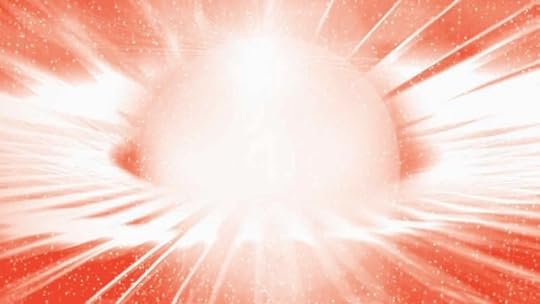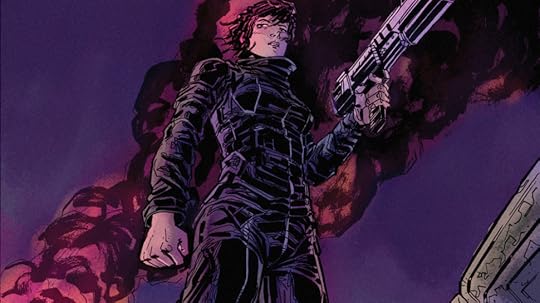Roche Limit Is Heading to SyFy—What Does That Mean?

Some of you may have seen the news from last week: Roche Limit is heading to TV via SyFy, with Fremantle (the producers of American Gods) and Heavy Metal producing. Which is great news! I, for one, couldn't be more excited. But, since the announcement, I've gotten a lot of questions about what this mean (and a lot of kind words as well—thank you for them all), so I figured I'd talk about this process a bit—kind of “how a bill becomes a law,” but repurposed as “how a comic becomes a TV show.”
This all started about two years ago when Heavy Metal optioned Roche Limit from me. Some of the people involved in Heavy Metal have a great history in film and TV (one them, in fact, produced one of my favorite movies of all time, Dark City), and they saw a lot of potential in Roche Limit. And, in a sense, they were right. Because just as soon as Heavy Metal announced the option, they received a call from Fremantle inquiring on the property. A little bit of time passed, some back and forth, and a few months later, Heavy Metal and Fremantle reached an agreement to co-produce a Roche Limit show together.
But let me back up and give a sense of scope here. At this stage, the reality of Roche Limit becoming, well, anything, was way far off. To be honest, options aren't all that rare. When you hear about a comic or book getting optioned, any and all enthusiasm should be tempered by who exactly is doing the optioning and what it's for. More times than not, when something is optioned, it's optioned by either a production company or maybe even a lone producer. And that's fine and great, but what an option means in this case is that the creator (or creators) is handing over the right for whoever is doing the optioning to shop the property around. Basically, the producer or production company is a conduit to the next, bigger step: Getting a network involved.
Now, this is where TV and film are different. In TV, hardly anything is going to be made without a network (and a network includes Netflix, Amazon, Hulu, etc.) already involved. There are cases where production companies will produce pilots and shop them to networks, but that doesn't happen too often. One, it's expensive to do that. And, two, shooting a pilot cements too many decisions—particularly the creative talent involved—that the network would generally like to have a say in. But with a movie, a producer can conceivably option whatever they want, get whatever director, actors, crew, etc., involved and get the thing made. Then, they go out and find a distributor.

That said, if a comic or book is optioned by a production company, there's still a big hurdle (well, many big hurdles) to be leapt over. If it's option—or purchased, which is even better—by a network, now you're cooking. A network can finance it, produce it, air it—everything. Granted, they like to find partners—which is why, after the end credits of a TV show, you'll see like three different production companies credited—but they don't have to.
Also, I want to point out something important before someone pulls a “well, actually” on me: Mileage varies on these things all the time. Experiences vary wildly, and the ground I'm covering isn't law. It's a general sense of how these things work, filtered through my own experiences.
Getting back to Roche Limit: We had two producers involved in Heavy Metal and Fremantle, which was good. The next step, before talking to a network, was to get talent involved. When you start shopping to a network, you want to create a package that not only helps sell the show by having an established writer or director involved (typically it's one of these two), but it helps crystalize what the show would actually be. (And no, this doesn't contradict what I said earlier about the network wanting to be involved in the creative hiring process—to shop, you just need one person, not an entire crew). The idea is that this person can come in and create a clear vision of what the adaptation would be—and with that vision, they can sell a network on the awesomeness of said adaptation. They can go into a room with network execs and sell the show in a way that leaves them dying for more—that's when they're compelled to buy in. Not only that, but this person will offer a steady hand; they're experienced and have the credentials that ensure everyone involved that not only can they craft this amazing story, but they can handle the responsibilities of leading the show, at least in part.
That said, Fremantle and Heavy Metal found their man in Will Pascoe, who'd been a writer on Orphan Black, Shut Eye, and other TV shows. Will came in with a vision for Roche Limit that blew everyone away, and he clearly has the experience to do the job. And, this doesn't even mention that fact that he's a great, great guy and a huge Star Wars fan.
At this point, we had Heavy Metal, Fremantle, and Will. Those are really good pieces. So, it was time to shop. Generally, what happens here is the producers leverage their relationships to get meetings with networks all over town. And in these meetings, the writer or director has their sales pitch ready, and they go in and try to dazzle the network execs. And this happened with Roche Limit, sort of. See, SyFy had expressed interest in doing an adaptation for years, since the option first happened. But, for one reason or another, they never made the decision to move forward—not until all these pieces, particularly Will and his experience and his vision, were connected to the property.
Now, think of this whole process as an inverted funnel. At the top are options, the first step, and the most common one, in seeing an adaptation to the end. The next step is often conflated, with the talent and the network oftentimes running parallel tracks, though the talent is usually first. The next rung down the funnel is when things starting getting serious—most adaptations die at the option level. But Roche Limit didn't (thankfully). Instead, we're at the rare point where actual things are getting made. It's not just meetings and pitches and all that: Will is writing the script for the pilot episode, which is a serious—and amazing—commitment on SyFy's part.

And that's where we're at. What's next? Well, a lot of things. Right now, Will, Fremantle, Heavy Metal, and SyFy are all discussing the scope of the show on a whole as well as the pilot episode itself. I'm involved in the process, working with Will as he steers this ship (and though I'm working with him, he's unquestionably the person at the helm). And, let me tell you, I've read Will's outline for the episode, and we've talked about the things to come, and it's all incredible. Seriously, he's taken the core of Roche Limit, the heart and soul, and fashioned it in a way that's totally recognizable but also streamlined and completely fresh. It's so good it makes me jealous that I didn't do the things in my scripts that Will is doing in his.
Once we're past this stage, Will goes off to write the entire first episode, start to finish. Then he likely turns it over to Fremantle and Heavy Metal, and they give their notes and feedback, then Will makes revisions. But once they're all set, the script moves on to the execs at SyFy, and they decide what's next—and this is where the funnel narrows once more. Based on the script and the confidence they have in the show, SyFy can either 1. order a pilot episode to be made; 2. order an entire season; or 3. do nothing, and the show dies right there and then.
Let's all seriously hope for 1 or 2!
That, my friends, is where Roche Limit is at. More updates to come as I have them!



